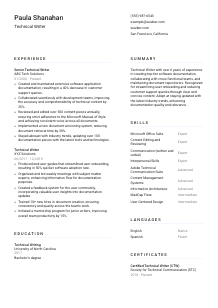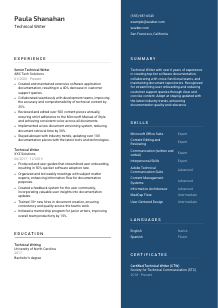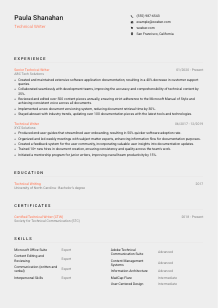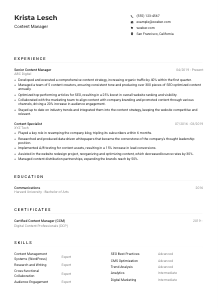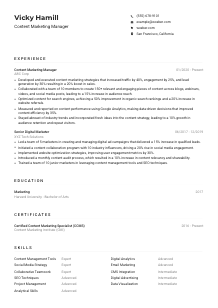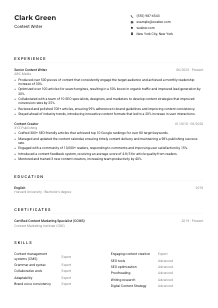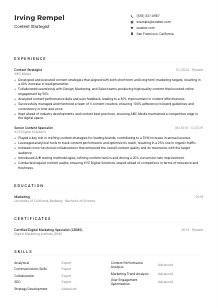Technical Writer Resume Example
Translating tech talk, but your resume doesn't resonate? Dive into this Technical Writer resume example, penned with the Wozber free resume builder. Discover how effortlessly you can articulate your technical flair to meet job needs, making your career narrative as clear and concise as your hardware diagrams!
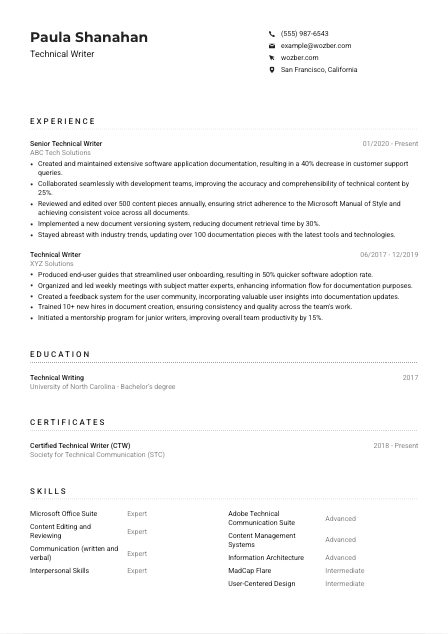
How to write a Technical Writer resume?
Embark on a journey tailored to aspiring Technical Writer aiming to crystalize their expertise into a compelling resume that not only stands out but firmly secures their position in the competitive tech industry. Crafting a resume with Wozber does not just transpose your experiences onto paper; it's about honing a narrative that speaks volumes to hiring managers, emphasizing your ability to transform complex technical discourse into comprehensible content.
Let's dive deep into personalizing your resume for that dream Technical Writer position, ensuring it sails smoothly through Applicant Tracking Systems (ATS) and lands right in the hands of the hiring team.
Personal Details
The Personal Details section is your resume's opening act, where first impressions are formed. For a Technical Writer, showcasing precision from the get-go is crucial. Here's how to finetune this section to align perfectly with your targeted job.
1. Professional Naming
Let your name shout professionalism. Choose a legible font style and size that sets it apart without overpowering the document. Remember, this is the first thing a hiring manager will see.
2. Role Alignment
Position yourself from the start by inserting the targeted job title beneath your name, in this case, 'Technical Writer'. This aligns your identity with the role, making it clear what you're aiming for.
3. Essential Contact Info
Accuracy is non-negotiable. Provide a streamlined professional email and your best contact number. A little tip: a professional email typically includes your first name and last name, signaling seriousness and attention to detail.
4. Location Details
For roles with a specific location requirement, like our San Francisco-based Technical Writer position, including your city and state not only confirms eligibility but also eases potential relocation concerns.
5. Web Presence
If you've compiled a portfolio or maintain a professional blog showcasing your ability to distill technical information, adding a website link can be a powerful add-on. Ensure the content mirrors your resume, showcasing consistency and dedication.
Takeaway
With your Personal Details finely calibrated, your resume begins on a note of clarity and professionalism, mirroring the precision you'll bring to your Technical Writer role. Remember, this section is more than just information; it's your first opportunity to demonstrate alignment with your desired position.





Experience
In the realm of Technical Writing, your experience section is your portfolio. It's where you weave your career narrative, highlighting your prowess in making complex technicalities accessible. Let's shape this section to reflect your unique journey.
- Created and maintained extensive software application documentation, resulting in a 40% decrease in customer support queries.
- Collaborated seamlessly with development teams, improving the accuracy and comprehensibility of technical content by 25%.
- Reviewed and edited over 500 content pieces annually, ensuring strict adherence to the Microsoft Manual of Style and achieving consistent voice across all documents.
- Implemented a new document versioning system, reducing document retrieval time by 30%.
- Stayed abreast with industry trends, updating over 100 documentation pieces with the latest tools and technologies.
- Produced end‑user guides that streamlined user onboarding, resulting in 50% quicker software adoption rate.
- Organized and led weekly meetings with subject matter experts, enhancing information flow for documentation purposes.
- Created a feedback system for the user community, incorporating valuable user insights into documentation updates.
- Trained 10+ new hires in document creation, ensuring consistency and quality across the team's work.
- Initiated a mentorship program for junior writers, improving overall team productivity by 15%.
1. Requirement Breakdown
Scan the job description and identify keywords related to experiences, such as 'Created and maintained documentation' or 'Collaborated with development teams.' Weaving these into your resume asserts your competency and ATS compatibility.
2. Role and Timeline Clarity
Organize your professional path in reverse chronological order, ensuring each position is clearly labeled with your title, the company's name, and the timeline. This structure immediately informs recruiters of your journey's trajectory.
3. Achievement Spotlight
Detail achievements using action verbs, as seen in the example: 'Created and maintained extensive software application documentation, resulting in a 40% decrease in customer support queries.' Quantify results where possible, giving tangible proof of your impact.
4. Relevance and Precision
Keep every bullet point relevant to the Technical Writer role, emphasizing tasks and results that align with the job description. Extraneous information dilutes the potency of your professional story.
5. Continuous Improvement
Demonstrate your commitment to staying updated with industry trends, as shown by 'Stayed abreast with industry trends, updating over 100 documentation pieces.' This not only shows adaptability but also positions you as a proactive learner.
Takeaway
Skillfully narrating your experience solidifies your candidacy, presenting you as the Technical Writer who not only meets but exceeds expectations. Each detail contributes to a vivid, compelling narrative poised to captivate the hiring manager's attention.
Education
In the Technical Writer domain, your educational background sets the foundation for your ability to comprehend and communicate complex information. Tailor this section to highlight how your academic journey aligns with the role at hand.
1. Degree Specification
Highlight your relevant degree to directly match the job's requirements. For instance, listing your 'Bachelor's degree in Technical Writing' vividly echoes the job description, establishing a clear link between your qualifications and the role's prerequisites.
2. Straightforward Structure
Maintain clarity and simplicity in presenting your educational accolades: the degree, your major, the institution, and your graduation year. This format is not only ATS-friendly but also allows quick scanning by hiring managers.
3. Degree Tailoring
Ensure the degree listed sharply aligns with the job specs. If 'Bachelor's degree in Technical Writing, English, Communications, or a related field' is sought, mirror this language precisely to affirm your eligibility.
4. Course Relevance
For roles requiring specialized knowledge, listing pertinent courses or projects can be beneficial. Although not necessary for every resume, it can reinforce your suitability, especially in early-career stages.
5. Additional Achievements
Merit-based scholarships, honors, or involvement in relevant clubs or organizations demonstrate initiative and dedication beyond mere coursework, potentially setting you apart in a pool of similarly qualified candidates.
Takeaway
Your education section should not only fulfill basic requirements but also demonstrate your commitment to the field of Technical Writing. Every element should resonate with the targeted role, reinforcing your profile's strength.
Certificates
In a field that values precision and ongoing learning, certifications can significantly bolster your application. Let's delve into presenting this information in a manner that shines a spotlight on your dedication and expertise.
1. Job Requirements Analysis
Before listing certifications, revisit the job description to gauge if any specific credentials are requested or implied. While not explicitly requested, including certifications like 'Certified Technical Writer (CTW)' denotes a commitment to professional growth.
2. Selective Listing
Choose to list certificates that resonate most with the job requirements, portraying a focused pursuit of knowledge and skill enhancement. This approach keeps your resume concise and targeted.
3. Date Clarity
For certifications with validity periods or recent achievements, noting the acquisition or expiration dates helps hiring managers assess the currentness of your qualifications.
4. Continuous Upgradation
The tech field evolves rapidly, and so should you. Regularly updating your certifications (or pursuing new ones) in areas critical to Technical Writing demonstrates a proactive approach to professional development.
Takeaway
Carefully curated certifications underscore your specialized knowledge and dedication to staying at the forefront of the Technical Writing field. Let each certificate tell a story of commitment and continuous learning.
Skills
The Skills section is your moment to shine, revealing the depth of your technical toolkit alongside your unrivaled communication skills. This blend is crucial for a Technical Writer, and here's how to spotlight it effectively.
1. Unpacking the Job Description
Dissect the job listing to extract both implied and explicit skill requirements. Demonstrating proficiency in 'Microsoft Office Suite' or 'Adobe Technical Communication Suite' directly aligns with typical job demands.
2. Skills Alignment
Ensure your listed skills reflect those sought in the job description, fostering an immediate connection between your capabilities and the role's needs. For Technical Writers, this means balancing technical acumen with stellar communication abilities.
3. Organized Presentation
While it might be tempting to list every skill you possess, prioritize those that will most intrigue the hiring manager. An organized and focused presentation of skills facilitates an easier match of your profile to job requirements.
Takeaway
Thoughtfully selecting which skills to feature highlights your understanding of the Technical Writer role and your readiness to excel in it. Showcase a balanced mix of technical and soft skills to illustrate your well-rounded candidacy.
Languages
In today's interconnected world, linguistic skills can set you apart, offering a unique advantage especially in tech companies with global reach. Tailor this section to demonstrate not just your technical expertise but your cultural and communicative breadth.
1. Revisiting the Job Description
Start by identifying if the job explicitly requires linguistic proficiency. Given the focus on 'English speaking proficiency,' highlight your mastery of English first and foremost, noting it as 'Native' or 'Fluent.'
2. Primary Language Highlight
Clearly state your command over the essential language(s) for the job. In the case of our Technical Writer position, showcasing 'English: Native' demonstrates your capability to produce clear, concise, and accurate documentation.
3. Additional Language Skills
Listing other languages can underscore your versatility and potential to communicate across diverse teams or even localize content. This becomes a bonus, adding depth to your profile.
4. Honesty in Proficiency
Be honest about your level of proficiency. Overstating your ability can lead to challenges down the line, while accuracy presents you as trustworthy and self-aware.
5. Role-Related Considerations
For Technical Writers, especially those in multinational companies or those creating content for diverse audiences, showcasing multiple languages can significantly enhance your appeal as a candidate.
Takeaway
Your linguistic skills reflect not just your ability to communicate but also your readiness to engage with global teams and audiences. These capabilities, while might seem peripheral, contribute to painting a well-rounded picture of you as a Technical Writer.
Summary
Your summary is your chance to encapsulate your professional essence in a few powerful sentences. For a Technical Writer, it's about striking a balance between technical savvy and communicative clarity.
1. Grasping the Job Essence
Deeply understand what the job entails. Your summary should resonate with phrases like 'creating top-tier software documentation' and 'streamlining user onboarding,' highlighting keywords from the job description.
2. Strong Opening
Start with a confident introduction to yourself as a professional. Mention your years of experience and your core area of expertise, positioning yourself as a problem-solver and a vital asset from the get-go.
3. Addressing Core Requirements
Identify and weave in key job requirements into your summary. This not only aligns your profile with the role but also demonstrates your ability to distill complex technical data, mirroring the essence of a Technical Writer's duties.
4. Brevity is Key
Your summary should be concise yet impactful, serving as a teaser that invites the hiring manager to delve deeper into your resume. Aim for 3-5 compelling lines that paint a clear, exciting picture of what you bring to the table.
Takeaway
Crafting a compelling summary imbues your resume with personality and direction, setting the tone for the narrative that follows. It's an invaluable opportunity to make a memorable impression, ensuring your resume not only meets the mark but captivates.
Embarking on Your Technical Writer Journey
With these detailed explorations and enhancements rooted in the nuances of the Technical Writer profession, you're poised to craft a resume that not only resonates with hiring managers but also sails through ATS with ease. Every section of your resume should breathe life into your professional story, illustrating a candidate who's not merely fit for the role, but exceptionally so. Harness the power of Wozber's free resume builder, including the ATS-friendly resume template and ATS resume scanner, to ensure your resume isn't just seen - it's remembered.
Ready to let your story unfold? The next great chapter of your career is just a resume away.

- Bachelor's degree in Technical Writing, English, Communications, or a related field.
- Minimum of 3 years experience in technical writing or a related role.
- Proficiency in using documentation and publishing tools, such as Microsoft Office Suite, Adobe Technical Communication Suite, and MadCap Flare.
- Strong attention to detail, excellent written and verbal communication skills, and the ability to distill complex technical information into clear, concise content.
- Familiarity with style guides such as the Microsoft Manual of Style and Chicago Manual of Style.
- English speaking proficiency required.
- Must be located in San Francisco, CA.
- Create and maintain documentation for software applications, development processes, and end-user guides.
- Collaborate with subject matter experts, development teams, and other stakeholders to ensure accuracy and comprehensibility of technical content.
- Review and edit content to adhere to established style guidelines, creating a consistent voice across all documentation.
- Manage document versioning and maintain a document repository for easy access and retrieval.
- Stay updated with the latest industry trends, tools, and technologies related to technical writing to enhance the quality of documentation.





